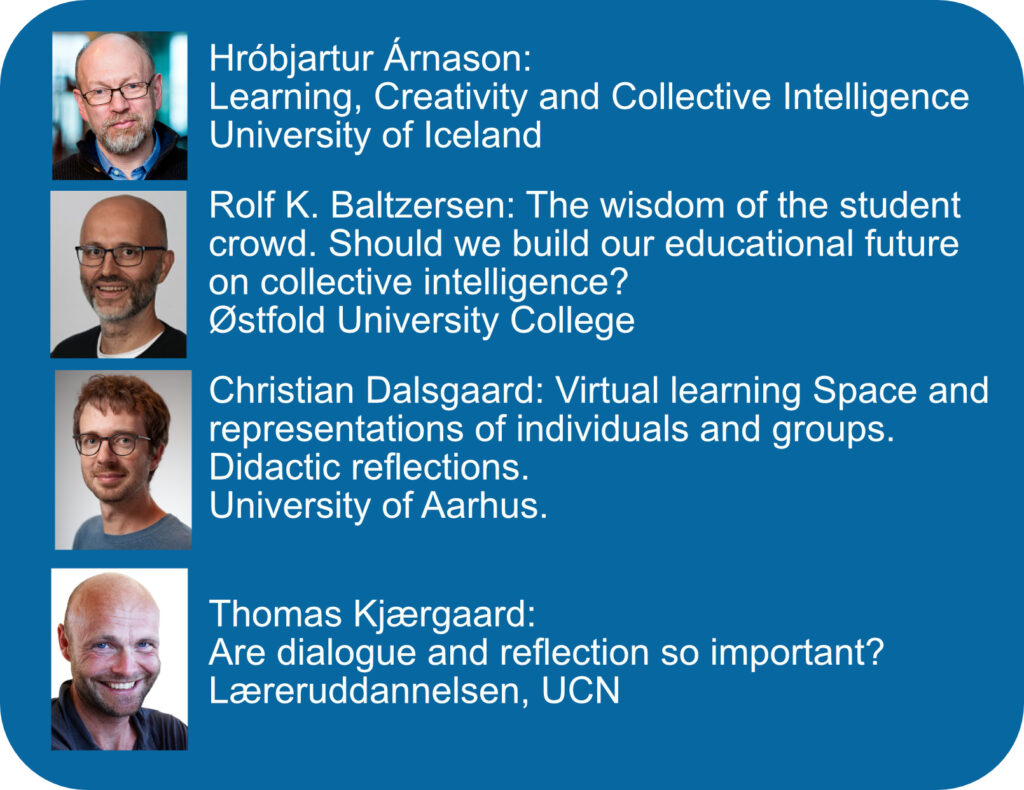Link til zoom møde: https://us02web.zoom.us/j/85836465761?pwd=aTBlRm5kd2hyUFM0TVNHT1dNcUhiUT09
Link Break Out Room: https://us02web.zoom.us/j/85628107206?pwd=ZWk5SEYrWnVxcGJoSEwrOXh4RXVrdz09
Hrobjatur Arnason: keynote: http://tiny.cc/lcci
Hrobjatur Arnason PaaD Nordic: http://tiny.cc/paadnordic
Collective Intelligence is a way of addressing learning and collaboration that has begun making its entrance into the world of education. Learning is an individual matter as well as something that happens in conjunction with other people and technologies. Participation in and building networks is constitutive of learning, and what we learn in one or another educational setting only makes sense when it is unfolded as competence in interaction with others.
Collective Intelligence can be defined in different ways, and the concept itself expresses an understanding that defines intelligence in when action and comprehension arise and qualify in networks and interactions between people and technologies. Digital media transform our possibilities and understandings, but we are only on our way in being able to think about learning and didactics in the new realities.
At all times intelligence is more than what is linked to the individual human being. Collective Intelligence states that knowledge, learning, and intelligence are actions and understandings that we create in interaction. An interaction where we also address the technologies not just as passive mediators, but as actors involved in creating networks – networks that will be the framework for the interplay between understanding and action.
The programme has been developed in cooperation between IDA Education and FLUID. IDA Education will receive copy of participants list for their statistics.

Program
12:30 Welcome: Henrik Helms, FLUID
12:45- Keynote: Hróbjartur Árnason, University of Iceland: Learning, Creativity and Collective Intelligence
13.20 Q & A
13:30 – Rolf K. Baltzersen: The wisdom of the student crowd. Should we build our educational future on collective intelligence? (in Norwegian). Rolf K. Baltzersen, Østfold University College – See description below
14:00 Coffee Break
14:15 – Christian Dalsgaard: Virtual learning Space and representations of individuals and groups. Didactic reflections. University of Aarhus. (in English)
14:45 Thomas Kjærgaard: Are dialogue and reflection so important? UCN. (in Danish)
15:15 Workshops
| Workshops | |
| Collective problem-solving (in Scandinavian) Main Conf. | Rolf K. Baltzersen & Henrik Helms |
| Collective Intelligence in International projects (in English) Breakout Room | Hróbjartur Árnason & Jørgen Grubbe, Torhild Slåtto |
15:45 – Perspectives, summing up (Jørgen Grubbe, FLUID)
Extended description
Rolf K. Baltzersen: The wisdom of the student crowd. Should we build our educational future on collective intelligence?
In this talk, I will first briefly present collective intelligence, a key term in the era of digital communication that highlight several different types of collective problem solving. Humans share this type of intelligence with other animals. Today, it is evolving into forms that are increasingly complex, including new practices such as crowdsourcing and online knowledge sharing. Some also claim that collective intelligence is necessary if we are to solve the big challenges of humanity.
Building on a case study of collective peer teaching, I will show how collective intelligence can strengthen learning outcomes in formal education. At a deeper level, a full-scale implementation requires a shift in focus from the single expert teacher to the acknowledgement of the superiority of the wisdom of the student group. (in Norwegian)
Torhild Slåtto, Jørgen Grubbe and Hróbjartur Árnason, Collective Intelligence in International projects (in English). Many who work within education regularly participate in transnational educational projects. Sometimes they turn out to lead to important learnings for ourselves, our institutions and hopefully the benefactors the projects are aimed at. In a NordPlus project we have been studying such projects and their “afterlife”. Through our studies we have learned about how collective intelligence is developed in a number of ways, and that the various “collaborative structures” project partners “stumble upon” can lead to the development of collective intelligence and thus meaningfull learning for all involved. In this presentation the three presenters invite you to join in their intriguing collective learning journey.
Thomas Kjærgaard: Are dialogue and reflection so important?
Research in AI and education indicate that the future belongs to the teacher who can collaborate with AI. If this is true, then the human competencies that are difficult to ‘algorithmize’ become crucial. – And dialogue, reflection, and the ability to create (entelechy) seems to move into the center of our activities.
The the presentation looks at how the human competencies ‘dialogue’, ‘reflection’, and ‘entelechy’ in interaction with technologies can exemplify distributed cognition in educations that bring the human being to the center and thus also the learner in education.
Finally, the presentation discusses synergies between technologies and humans that challenges the rules we have known for society and education – the question of the technological singularity
Praktisk
The Webinar will take place 3rd of June 2021 12:30-16:00
Webinaret is free for members FLUID members and other Flexible Education National organisations in Nordic Countries – please inquire head of secretariat Poul Tang at fluid@fluid.dk if in doubt.
Price for non-members is 500 DKK – excl. VAT.
Kontakt Poul Tang fluid@fluid.dk for yderligere information.
